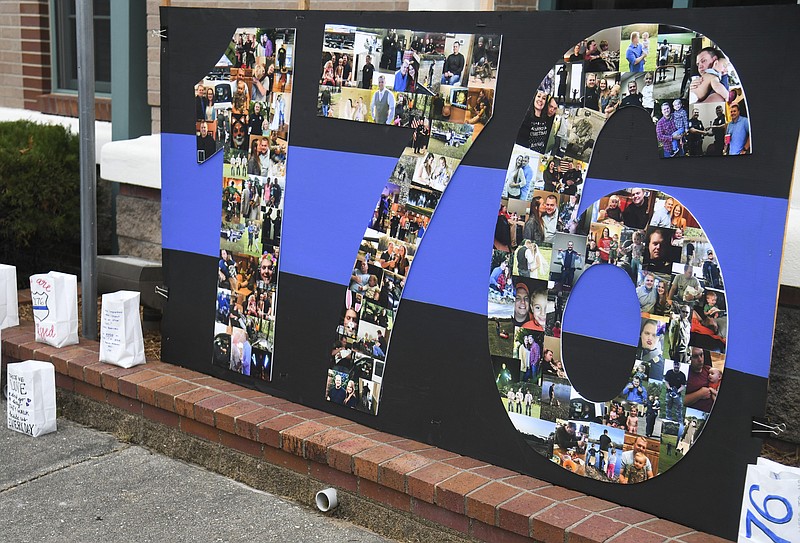The girlfriend of a man convicted on July 28 of first-degree murder for the 2020 shooting death of Hot Springs police Officer 1st Class Brent Scrimshire was sentenced to 34 years in prison Wednesday after pleading guilty to multiple charges for her role in the officer's death.
Coraima Hernandez, 23, of Hot Springs, who has remained in custody since her arrest the day of the shooting on March 10, 2020, pleaded guilty to two counts of aggravated assault and two counts of second-degree battery, and was sentenced to six years on each count, and to one count of hindering apprehension, and sentenced to 10 years, all to run consecutively for a total of 34 years.
"These charges are the ones that we could prove at a jury trial beyond a reasonable doubt," according to a statement from the Garland County prosecutor's office received via email following the change of plea. "They are the maximum sentence for each felony and each sentence doesn't begin until the previous one ends. In other words, each sentence runs after the previous one is complete."
Hernandez's boyfriend, Kayvon Ward, 24, was found guilty after a two-week trial in Garland County Circuit Court and sentenced to two consecutive life sentences for the death of Scrimshire and the aggravated assault of Officer Anthony Larkin who was assisting Scrimshire in trying to arrest Ward after a routine traffic stop on Kenwood Street.
Ward was originally charged with capital murder and could have faced the death penalty, but the jury found him guilty of the lesser charge of first-degree murder.
Hernandez, who fought with Scrimshire and Larkin at the scene of the traffic stop, allowing Ward to flee, which culminated in the fatal shooting, was originally charged with capital murder in the case.
"Our office charged Coraima Hernandez with capital murder because there was probable cause to do so and we believed that the evidence would come out to support a conviction for capital murder," the statement said.
"Despite an excellent investigation, we had concerns that potentially a jury would not find beyond a reasonable doubt that Ms. Hernandez knew Kayvon Ward had a gun. There is an affirmative defense that prevents a conviction on a person that does not know that their accomplice has a gun," it said.
Prosecuting Attorney Michelle Lawrence told The Sentinel-Record in an interview on Thursday they were hopeful there would be testimony at Ward's trial that would show Hernandez was aware Ward had a gun, but "it never came to fruition."
She said the prosecutors "tried to formulate questions with all the witnesses to bring that out" but it never happened, noting Hernandez did not testify at Ward's trial and has never admitted to knowing he had a gun.
Lawrence said they spoke with Scrimshire's wife, Rachel, and his mother and Larkin and also discussed it with Police Chief Chris Chapmond and Assistant Police Chief Billy Hrvatin prior to the plea offer being made to Hernandez and even consulted with legal colleagues to make sure "we left no stone unturned."
Rachel Scrimshire and Larkin both approved the plea offer, she said, noting, "They didn't like it, neither did we, but they understood." A court order was also issued Wednesday barring Hernandez from any future contact with Larkin and his family or Scrimshire and her family.
Lawrence serves on the Arkansas Prosecuting Attorney's Legislative Committee and said she intends to argue for a law that holds someone fully accountable when they interfere with an arrest that leads to an officer's serious physical injury or death.
"I believe if (Hernandez) had not arrived at the scene and became involved, we would have had a very different situation and outcome," she said.
The email notes Ward was convicted of the lesser included offense of murder in the first degree because the jury did not find a premeditated and deliberate mental state.
Lawrence said she also intends to argue for a capital murder law where the state only has to prove the defendant has the "purpose" to kill an officer rather than have to prove the person acted with "premeditation and deliberation" to kill an officer.
According to previous reports and testimony at trial, Scrimshire had stopped Ward around 6:30 p.m. on March 10 after he ran a stop sign and then noted there was a small child in the car not in a child safety seat. Scrimshire asked Ward for his driver's license and for him to contact someone to retrieve the child or bring a car seat.
Ward reportedly provided a false name and date of birth at that time. Larkin arrived to assist Scrimshire and a few minutes later, Hernandez arrived and refused to tell the officers Ward's real name when asked.
Ward began attempting to exit the vehicle as the officers were speaking with Hernandez. The officers attempted to stop Ward and handcuff him, but he resisted arrest and began "actively fighting both officers." Hernandez began pulling and pushing on the officers and yelling at them to leave Ward alone.
Larkin told Hernandez to get off him and used his arm to push her off and during the scuffle Ward broke free and fled to a fenced-in backyard where he fired multiple shots at Scrimshire and Larkin as they chased him.
One of the shots struck Scrimshire in the upper torso above his bulletproof vest. Both officers then returned fire, striking Ward. Hernandez got into the driver's seat of the Nissan and fled the scene once the shots were fired.
Both Scrimshire and Ward were transported by LifeNet to local hospitals where Scrimshire was later pronounced dead. Hernandez was arrested a short time later that same night.

